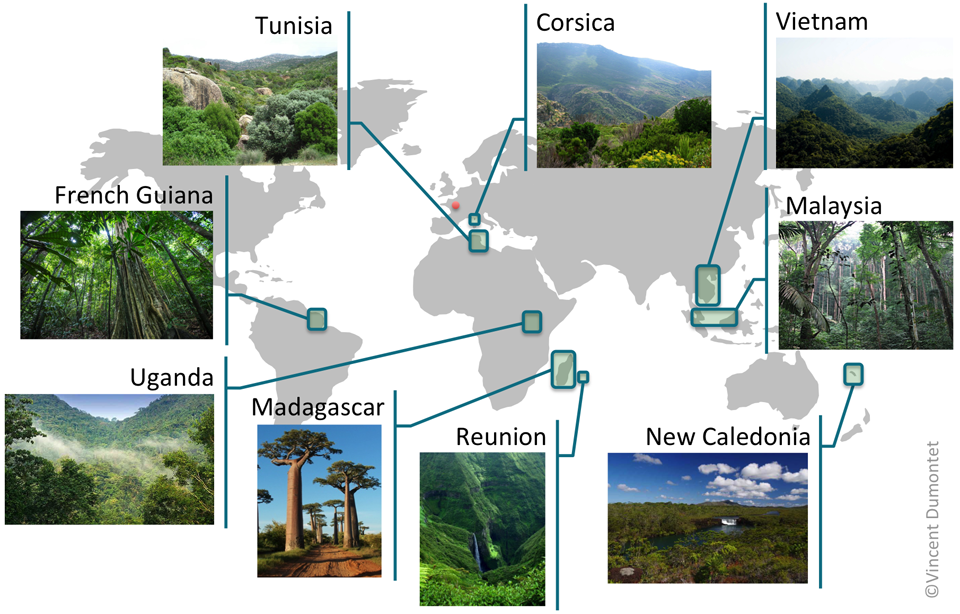Exploration and valorization of terrestrial plant biodiversity: the ICSN laboratory in Noumea (New Caledonia), and national and international cooperation.
Following close links between researchers from the ICSN and foreign researchers, several cooperation agreements have been established between the CNRS and various public institutions overseas: Malaysia, Vietnam, Madagascar, Uganda and Tunisia. Our group has also developed a number of specific partnerships with various universities and public bodies in the French overseas departments, regions and collectivities (DROM-COM): New Caledonia, French Guiana, Reunion Island and Corsica. These countries and DROM-COM are located in biodiversity-rich areas that we explore and survey. One of the team’s objectives is to discover, from higher plants, new bioactive molecules and/or with original scaffolds. Surveys and harvests are carried out regularly by partners in connection with the ICSN so as to constitute a collection of endemic and indigenous plants representative of these regions. From different parts of the harvested plants, crude extracts are systematically prepared and subjected to various biological assays. Then the “hits” selected undergo chemical and biological studies. The collection of extracts that constitutes the Extract library is the largest collection of natural extracts of the French public research body.

ICSN laboratory in Noumea

Since the 70s, the ICSN has a small structure, namely “Medicinal Plant Laboratory”, located in Noumea, New Caledonia. This unit is currently under the responsibility of V. DUMONTET. Since May 2004, and following an agreement between the ICSN and the IRD centre of Noumea, the laboratory is housed at the IRD center located in Anse Vata. Thanks to agreements with competent authorities of New Caledonia, this laboratory has direct access to an exceptional biodiversity. Its missions are carried out in the framework of Natural Substances and Medicinal Chemistry Department of the ICSN, and in collaboration with local scientific organizations. The research programs we develop focus on endemic plants from rain forests and mining scrubs.
Contact : Vincent Dumontet (+687 26 08 15), Laboratoire des Plantes Médicinales – CNRS, BP 643, 98845 Nouméa Cedex, Nouvelle-Calédonie.
Cooperation et collaborations
– French Guiana : The research programs on Guyanese plants and their associated microorganisms conducted by the ICSN, fall in the priority areas of LabEx CEBA (Center for the study of biodiversity in Amazonia).
– Reunion Island : Various research programs related to Mascarene flora are conducted jointly by the ICSN and the Faculty of Science and Technology of the University of Saint-Denis de la Réunion (collab. Prof A. BIALECKI).
– Corsica : A research program on Corsican Euphorbiaceae is conducted jointly by the ICSN and the Laboratory of Chemistry of Natural Products, University of Corsica Pasquale Paoli (Collab. Prof J. COSTA and Dr. J. PAOLINI).
– Madagascar : Since the 60s, historical links unite the ICSN with the IMRA (Malagasy Institute of Applied Research), which is located in Antananarivo, capital of Madagascar. This relationship is materialized through the signature of a cooperation agreement between the two partners in 2004, renewed since then by various endorsements.
– Malaysia : A cooperation agreement between the CNRS and the University of Malaya in Kuala Lumpur was initiated in 1982, and took the form of an LIA (International Associated Laboratory)(collab. Prof. K. AWANG) in 2014. This agreement has been renewed in 2018 for 4 years. The joint research programs concern endemic plants of rain forests of Peninsular Malaysia.
– Vietnam : A cooperation agreement, originally developed with the Institute of Chemistry of VAST in Hanoi (Vietnamese Academy of Science and Technology) in 1995, took the form of an LIA (International Associated Laboratory) between the ICSN-CNRS and the Marine Biochemistry Institute in early 2012 and has been renewed in 2016 for another four-year period. The scientists responsible for the Vietnamese side are Drs. N. VAN HUNG and P. VAN CUONG. The research programs developed within the LIA concern endemic plants of Northern and Central Vietnamese regions.
– Uganda : A Memorandum of Cooperation signed in 2006, embodied a new collaboration between the CNRS, the National Museum of Natural History (MNHN) in Paris, the Makerere University, Kampala et the Uganda Wildlife Authority. In 2016, a Material Transfert Agreement has been signed with the University of Makerere for a three-year period (collab. J. NAMUKOBE).
– Tunisie : A Material Transfer Agreement between the Faculty of Sciences of Sfax and the ICSN-CNRS was initiated in 2012 (Collab. Dr. N. ALLOUCHE). This agreement, which is being renewed, aims to promote Tunisian medicinal plants.

